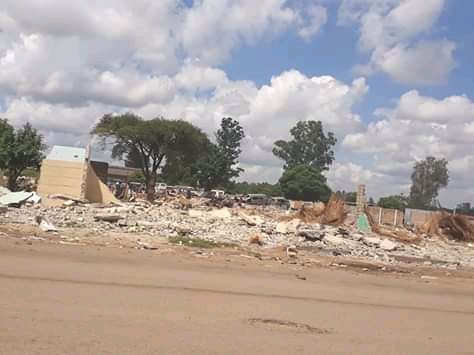|
Getting your Trinity Audio player ready...
|
By Zimbabwe Coalition on Debt and Development (ZIMCODD)
In Zimbabwe’s highly informal economy where employment in the formal sector is at an all-time low with several reports suggesting that unemployment is standing above 90 percent, the recent demolitions of vending markets queries, whether our preoccupation is on order and not livelihoods.
A 2018 study by the International Monetary Fund (IMF) revealed that Zimbabwe’s informal sector is the largest in Africa, with more than 60% of the economy being informal, and is also the second largest in the world, next to Bolivia. Simply put, livelihoods for most Zimbabweans are being sustained by the informal economy.
Since the beginning of the month in Harare, the City Council has been demolishing market stalls with more recent incidences in Mbare at Mupedzanhamo area stalls where City Council was backed by armed police officers. The recent demolitions were undertaken in defiance of a High Court order which barred the city authorities to continue with the destructions after the informal traders approached the courts for their protection.
These destructions are coming hot on the heels of nationwide lockdowns that have dealt a major blow on the poor who rely heavily on informal businesses, surviving on a hand-to-mouth basis. This continues to further expose the already existing wide gap between the rich and the poor. The rich at least can manage to stay at home avoiding contracting the coronavirus, something which is unbearable for the poor who have gone for very long periods without earning any income.
Informal trading in Zimbabwe has largely grown over the years to become a source of living for many Zimbabweans. A closer look at the current demolitions makes one wonder why these market stalls are being destroyed now when in fact they have been operating under the watch of the Council and police.
Without good notice to allow vendors to vacate, it becomes a deliberate violation of economic rights to simply destroy and impound the vendors’ wares. Although operating in “undesignated places” vendors have a right to find economic opportunity in an environment where opportunities to do so in the formal economy are scarce.
The council should be bolder in expanding the local economy and enterprises and dig deeper to address the underlying challenges in informal vending which include corruption, mismanagement, and political and elite capture rather than ravage the markets which are only a manifestation of deep-rooted problems.
One source (a trader at the Mupedzanhamo area) confirmed that they have been contributing a fee for the vending stalls to some political party representatives. Depending on the area one is selling from some were paying US$5 per day per market table.
With the hundreds of vendors that had mushroomed around the Mupedzanhamo area, the Council has been losing thousands of dollars which could have been channelled to public service delivery. According to The Herald report of 23 June 2021, Harare City Council collected 42 million dollars from the informal sector in the year 2020, which could have been more had it not been for the COVID-19 lockdown which disturbed normal operations of the traders. This indicates that if the informal sector is properly structured and regularised it has the potential to contribute massively to the economy.
The informal sector is now considered the backbone of the Zimbabwean economy, contributing approximately to 80% of the national development. According to the ILO 2018 report on Women and Men in the Informal Economy, women constitute 53% of the informal sector in Zimbabwe and the destruction of market stalls directly impacts and disadvantages women who already earn less or nothing through unpaid care work whilst most of them double as breadwinners on little income.
The country’s vision to become an upper-middle-income economy by 2030, includes the construction of at least 200 000 new houses by 2023, ‘apartments that are unfit for human habitation will be rebuilt and informal settlements revamped as part of a raft of measures to overhaul Zimbabwe’s housing sector. So far, the ongoing destructions of both market stalls and houses for the poor and vulnerable groups are contrary to this vision. The system is violating the rights of the most vulnerable members of society who need social protection which the government itself is failing to provide.
As much as safety and order are important, the livelihoods of hundreds of people who are relying on selling their wares at Mupedzanhamo and their immediate and extended families who are dependent on them are equally important or else people are relegated to extreme poverty.
The Local Authorities can do better than demolish market stalls of vendors without providing acceptable alternative space for them. The Council could have prepared makeshift market stalls for the vendors whilst preparing for alternative solutions rather than expose these groups who are trying to make an honest living.
Given the high rate of unemployment in Zimbabwe, the Council should be more considerate in dealing with this sector. The increase of vending stalls is a clear sign of the high rate of unemployment, when more jobs are created the vending stalls will also start to disappear. A sensitive government should be able to provide acceptable alternatives first before going ahead with demolitions.
To address these ongoing challenges, some of the Recommendations include:
• Strengthening governance structures in local authorities and improving transparency and accountability to enhance revenue collection which the Local Authorities need. To achieve this, the existing elements such as political interference, poor corporate governance and endemic corruption have to be arrested;
• There is a need for councils to deal with internal malpractices first before dealing with external factors which affect more livelihoods.;
• Engage with vendors and come up with immediate solutions whilst working on permanent and sustainable solutions; and
• Resuscitating the existing structures at Mbare Mupedzanhamo.






